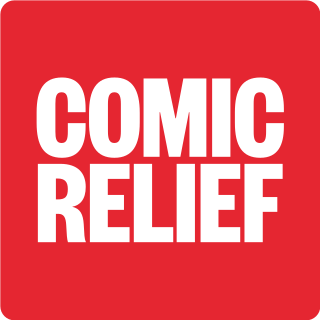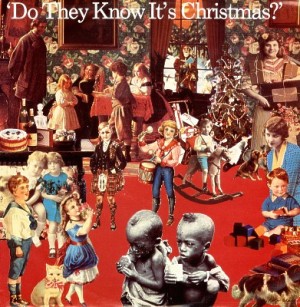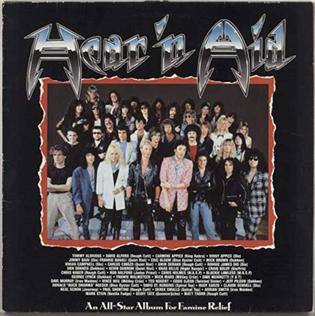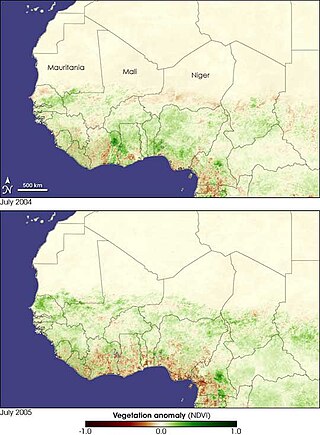
Comic Relief is a British charity, founded in 1985 by the comedy scriptwriter Richard Curtis and comedian Sir Lenny Henry in response to the 1983-1985 famine in Ethiopia. The concept of Comic Relief was to get British comedians to make the public laugh, while raising money to help people around the world and in the United Kingdom. A new CEO, Samir Patel, was announced in January 2021.
Band Aid is the oldest collective name of a charity supergroup featuring mainly British and Irish musicians and recording artists. It was founded in 1984 by Bob Geldof and Midge Ure to raise money for anti-famine efforts in Ethiopia by releasing the song "Do They Know It's Christmas?" for the Christmas market that year. On 25 November 1984, the song was recorded at Sarm West Studios in Notting Hill, London, and was released in the UK on Monday 3 December. The single surpassed the hopes of the producers to become the Christmas number one on that release. Three re-recordings of the song to raise further money for charity also topped the charts, first the Band Aid II version in 1989, the Band Aid 20 version in 2004 and finally the Band Aid 30 version in 2014. Band Aid II and Band Aid 20 were also Christmas number one. The original was produced by Ure. The 12" version was mixed by Trevor Horn.

Live Aid was a two-venue benefit concert and music-based fundraising initiative held on Saturday, 13 July 1985. The event was organised by Bob Geldof and Midge Ure to raise further funds for relief of the 1983–1985 famine in Ethiopia, a movement that started with the release of the successful charity single "Do They Know It's Christmas?" in December 1984. Billed as the "global jukebox", Live Aid was held simultaneously at Wembley Stadium in London, and John F. Kennedy Stadium in Philadelphia.

A widespread famine affected Ethiopia from 1983 to 1985. The worst famine to hit the country in a century, it affected 7.75 million people and left approximately 300,000 to 1.2 million dead. 2.5 million people were internally displaced whereas 400,000 refugees left Ethiopia. Almost 200,000 children were orphaned.
A telethon is a televised fundraising event that lasts many hours or days, the purpose of which is to raise money for a charitable, political or other cause.

Hands Across America was a public fundraising event held on Sunday, May 25, 1986, Memorial Day weekend, which attempted to create a continuous human chain of people holding hands across the contiguous United States. While approximately 5.5 million people participated, the chain was broken in many places, particularly in the Southwestern desert. The number of participants would have been roughly sufficient to create an unbroken chain if they had been spread out evenly along the planned route, but most joined the chain in major cities and few traveled to more remote areas. The various gaps in the line between participants were filled using ribbons, ropes, or banners.
The Save the Children Fund, commonly known as Save the Children, is an international non-governmental organization. It was founded in the UK in 1919, the goal being to improve the lives of children worldwide.

"We Are the World" is a charity single recorded by the supergroup USA for Africa in 1985. It was written by Michael Jackson and Lionel Richie and produced by Quincy Jones and Michael Omartian for the album We Are the World. With sales in excess of 20 million physical copies, it is the eighth-best-selling single of all time, meant to raise money for the 1983–1985 famine in Ethiopia.

The Chicago Marathon is a road marathon held in October in Chicago, Illinois. It is one of the seven World Marathon Majors. Thus, it is also a World Athletics Label Road Race. The Chicago Marathon is one of the largest races by number of finishers worldwide. The race was awarded the World Athletics Heritage Plaque in 2024, for "outstanding contribution to the history and development of road running."

"Do They Know It's Christmas?" is a charity song written in 1984 by Bob Geldof and Midge Ure to raise money for the 1983–1985 famine in Ethiopia. It was first recorded by Band Aid, a supergroup assembled by Geldof and Ure consisting of popular British and Irish musical acts. It was recorded in a single day at Sarm West Studios in Notting Hill, London, in November 1984.

Hear 'n Aid was a charity record released in 1986. The record featured a supergroup of 40 heavy metal musicians on a track called "Stars". A music video was released as well, produced during the recording sessions. Proceeds from the album were used to raise over $3 million for famine relief in Africa.
Islamic Relief Worldwide is a faith-inspired humanitarian and development agency which is working to support and empower the world's most vulnerable people.

Latter-day Saint Charities is a branch of the welfare department of the Church of Jesus Christ of Latter-day Saints. The organization's stated mission is to relieve suffering, to foster self-reliance for people of all nationalities and religions, and to provide opportunities for service.

The 2005–2006 Niger food crisis was a severe but localized food security crisis in the regions of northern Maradi, Tahoua, Tillabéri, and Zinder of Niger from 2005 to 2006. It was caused by an early end to the 2004 rains, desert locust damage to some pasture lands, high food prices, and chronic poverty. In the affected area, 2.4 million of 3.6 million people are considered highly vulnerable to food insecurity. An international assessment stated that, of these, over 800,000 face extreme food insecurity and another 800,000 in moderately insecure food situations are in need of aid.

A benefit concert or charity concert is a type of musical benefit performance featuring musicians, comedians, or other performers that is held for a charitable purpose, often directed at a specific and immediate humanitarian crisis.
A charity supergroup is a music group comprising famous musicians or other celebrities which is formed to raise funds or awareness for charities or causes. The supergroup is usually together only for a single album, performance, or single.
UNICEF, originally the United Nations International Children's Emergency Fund, officially United Nations Children's Fund since 1953, is an agency of the United Nations responsible for providing humanitarian and developmental aid to children worldwide. The organization is one of the most widely known and visible social welfare entities globally, operating in 192 countries and territories. UNICEF's activities include providing immunizations and disease prevention, administering treatment for children and mothers with HIV, enhancing childhood and maternal nutrition, improving sanitation, promoting education, and providing emergency relief in response to disasters.

The Guru Gobind Singh Children's Foundation is a foundation run by children/youth with a vision to help other children meet their basic needs, while adding meaning to their lives, and carrying out the work in the spirit of the teachings of Sikh Gurus.

Arthur "Al" Howie was a Canadian long-distance runner who won more than fifty marathons, ultramarathons, and multiday races in over two decades, including the 1991 Trans Canada Highway run in the record time of 72 days and 10 hours. A brass plaque on Victoria's Mile Zero marker commemorates this athletic event for which he raised $750,000 for a fund for children with special needs. Two weeks after running across Canada he won the Sri Chinmoy 1300 Miler in New York improving on his own world record time. Both the Trans Canada run and the 1,300-mile (2,100 km) race qualified for the Guinness Book of Records. He lived in Duncan, B.C., from 2005 until his death in 2016. He had been receiving treatment for Diabetes I. The City of Duncan awarded him the Perpetual Trophy for Excellence and Sportsmanship in December 2007, and in 2014 he was inducted into The Greater Victoria Sports Hall of Fame.

The Race Against Time is a 1988 adventure video game designed by the Oliver Twins, and developed and published by Codemasters. The player controls Sudanese runner Omar Khalifa, who has to venture to six continents to light torch bowls and raise flags to begin the 1988 Sport Aid, a sport-themed charity organization. A tie-in to the Sport Aid charity, all proceeds were donated to the campaign. The game was released for the Amstrad CPC, Commodore 64, and ZX Spectrum platforms.













